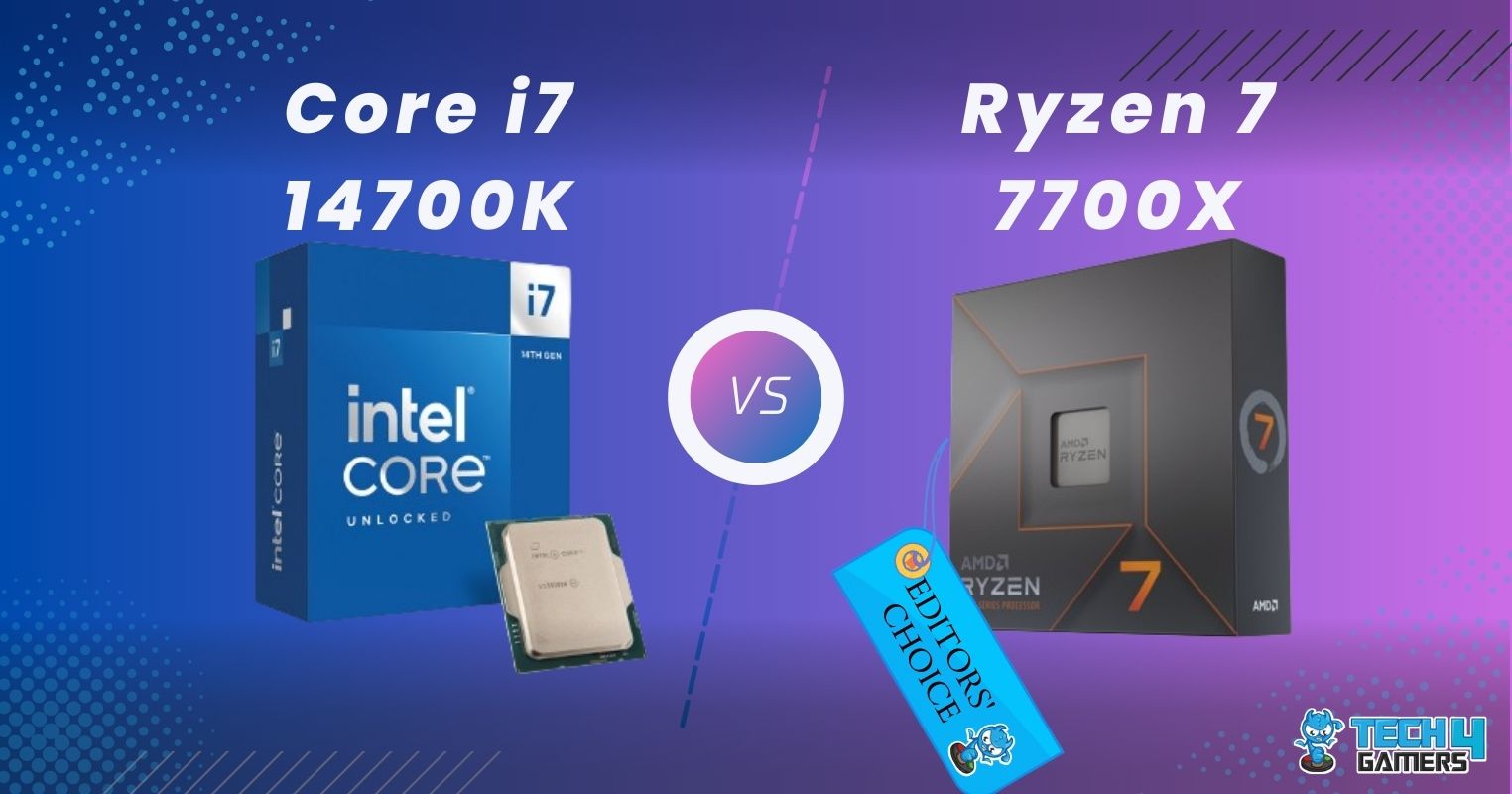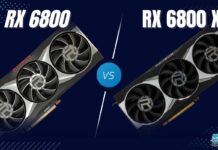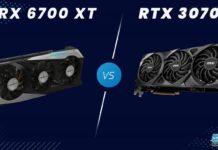
Core i7 14700K
Rated: 7/10
Ryzen 7 7700X
Rated: 8/10
Pros And Cons
| Featured | Core i7 14700K | Ryzen 7 7700X |
|---|---|---|
| Pros | ✅ More performance than its competitor ✅A higher thread count | ✅ Much lower power consumption than the 14th gen ✅ Lower price |
| Cons | ❌ High power consumption ❌Higher price | ❌Lower performance than the i7 14700K |
- During our tests, the Ryzen 7 7700X had 17% lower 1% lows than the Core i7 14700K. The Ryzen had lows of around 154 FPS, while the i7 had lows closer to 180 FPS.
- The Core i7 had around a 41% higher power consumption than the Ryzen 7 7700X in our testing, with the i7 taking 123 watts, while the Ryzen had a power consumption of 90 watts.
- The Core i7 14700K has a $80 higher price tag than the Ryzen 7 7700X when writing this article.
- The closeness in the performance of these chips lead us to believe that spending so much more on the Core i7 is not worth it, and you should instead opt for the Ryzen 7 7700X.
Comparison Table
| Feature | Core i7 14700K | Ryzen 7 7700X |
|---|---|---|
| Launch Date | Q3 23 | Q2 22 |
| Max. Operating Temperature | 100°C | 93°C |
| CPU Socket | Intel Socket 1700 | AM5 |
| Unlocked for Overclocking | Yes | Yes |
| Codename | Raptor Lake-R | Raphael |
| Best Motherboard | Motherboards For i7-14700K | Motherboard For Ryzen 7 7700X |
| Best Cooler | CPU Cooler For i7-14700K | CPU Coolers For Ryzen 7 7700X |
| Best GPU | GPU For Core i7-14700K | - |
Architectural Differences
- Core Count: The i7 14700K has 8 performance and 12 efficiency cores, adding up to 28 threads. In contrast, the Ryzen employs 8 performance cores, which add up to 16 threads.
- Frequency: The base frequency range of the i7 14700K is anywhere from 2.5GHz to 5.6GHz, whereas the Ryzen 7 has a range of 4.5GHz to 5.4GHz.
- L3 Cache: The cache on the Ryzen 7 7700X is 32MB, whereas the Core i7 14700K adds up to 33MB of shared L3 cache.
- Process Node: The Core i7 uses a 10nm manufacturing process, which has been used for a few generations, whereas the Ryzen 7 uses 5nm processing nodes.
- Boost Thermal Design Power: The TDP of the Core i7 14700K goes up to 253 watts, while the Ryzen goes up to a much lower 105-watt TDP.
- Other Features: The Ryzen 7 7700X has an equivalent for every feature that Intel advertises. This includes Smart Access Memory, XMP, Overclocking, and integrated graphics.
Despite what flashy reviews would say, companies wage their most intense wars in the mid-range section of their product stacks. In this comparison, we will compare two midrange processors, the Core i7 14700K vs Ryzen 7 7700X, to crown one as the king of midrange processors for this generation.
Benchmarks – 1080p
Differences on paper are one thing, but the actual gaming performance of these processors might be different when actually used in a system. To test this, we’ve specified a test bench that only leaves the processors as a bottleneck to stretch each CPU to its limit. The specifications of this system are written below:
- OS: Windows 11
- SSD: XPG GAMMIX S70 BLADE 2TB NVMe
- GPU – Nvidia GeForce RTX 4090 Strix
- CPU Cooler – Arctic Liquid Freezer II 420
- RAM – DDR5-6000 30-36-36-76
- Operating System – Windows 11
Rainbow Six Seige

- Rainbow Six Seige ran very smoothly on both of our processors. The i7 14700K had an average framerate of 646 FPS, while the Ryzen 7 was around 0.9% slower, with an average framerate of 640 FPS.
- Our tests also showed that the i7 14700K had lows of around 421 FPS, while the Ryzen 7 was much more stuttery with lows of around 360 FPS.
F1 2023

- The Core i7 14700K was slightly ahead of the Ryzen in our test of this game, with an average framerate of around 407 FPS, while the Ryzen came across with an average framerate of 406 FPS.
- Once again, the 1% lows were majorly lower on our Ryzen processor, hovering around the 240 FPS mark, while the Intel processor only went down to around 276 FPS.
Baldur’s Gate 3

- Our test of Baldur’s Gate 3 showed us the first large difference between the average framerates of these processors. The Core i9 14700K had a framerate of 106 FPS on average, while the Ryzen 7 7700X performed with an average framerate of 90 FPS. The difference here was around 17% in favor of the Core i9.
- The 1% lows fell to 67 FPS on the i7 14700K, whereas the Ryzen fell below the playable limit accepted by most gamers, delivering only 55 FPS in the occasional dips in our testing.
Cyberpunk 2077: Phantom Liberty

- It’s the first game that ran better on the Ryzen processor. The 7700X had an average framerate of around 173 FPS. The i7, however, could only manage a framerate of 164 FPS on average. The advantage of the Ryzen computes to around 5.5% in this game.
- The 1% lows flipped the standard, with the i7 14700K going down to a minimum framerate of around 114 FPS, while the Ryzen was a few frames behind, with a minimum of 111 FPS.
Final Fantasy XIV

- When we tested Final Fantasy XIV on our test rig with the i7, the average framerates shot up to 256 FPS. The Ryzen was much further behind in this regard, only showing an average of around 192 FPS. This marked a 33% improvement for the Intel processor.
- The 1% lows were also very noticeably ahead on the Core i7 14700K, with the processor dipping to around 143 FPS, while the Ryzen got down to around 103 FPS.
Starfield

- Even though Starfield was co-developed with AMD, the Intel processor performed substantially better. It gave an average framerate of around 126 FPS, while the Ryzen processor had an average framerate of around 100 FPS. This brings the Intel processor in the lead of around 26%.
- The 1% lows also had quite a difference between the two processors, with our benchmark showing lows of around 62 FPS for the Intel processor, while the 7700X had a framerate of 54 FPS.
The performance of these cards trade blows in terms of average framerates, but the trend in 1% lows has given the i7 the advantage so far. For a lot of people, lows more heavily dictate the smoothness of a game, so keep this in mind while reading our comparisons!
– Shehryar Khan
Overall Gaming Performance

Average FPS
The i7 14700K averaged a framerate of 273 FPS across the six games we tested, while the Ryzen 7 had an average framerate of 266 FPS. This computes to a total difference of around 2.6%. The framerate of the games we tested was sometimes equivalent on both processors, sometimes better on the Ryzen, and sometimes better on the i7.
Here is a glimpse into the gameplay we recorded while testing these CPUs:
1% lows
The 1% lows, however, were quite different on both processors throughout the games we tested. The Ryzen 7 7700X had a low of around 154 FPS in our tests, whereas the i7 had lows closer to 180 FPS. This makes a much larger 17% difference between the two processors. This really affects your gaming performance as the dips in framerate and the rises in frame time go a long way in making your gaming experience feel more stuttery.
Overall, the performance of the Ryzen is definitely lower than that of the Intel processor, but let’s weigh it out with the rest of the metrics to see if the R7 7700X makes up for it.
Winner: Intel's Core i7 14700K
Power Consumption
| Game | Core i7 14700K(W) | Ryzen 7 7700X(W) |
|---|---|---|
| Rainbow Six Seige | 132 | 91 |
| F1 2023 | 124 | 91 |
| Baldur's Gate | 131 | 89 |
| Cyberpunk 2077: Phantom Liberty | 133 | 88 |
| Final Fantasy XIV | 124 | 93 |
| Starfield | 121 | 90 |
| Average Power Draw | 127.5 | 90 |
| Winner: AMD's Ryzen 7 7700X |
||
The difference between these processors is around 41% in terms of power consumption. This might entail a cumulative difference over the years that can considerably reduce your power bill. In addition, you can get away with using a smaller power supply with the Ryzen, which can reduce your platform cost by quite a bit.
Price And Availability
| CPU | MSRP | Current Price |
|---|---|---|
| AMD Ryzen 7 7700X | 💲399 | 💲319 |
| Intel Core i7 14700K | 💲409 | 💲404 |
| Price Difference | 102.5% | 126% |
The price difference between the two CPUs is quite large. On the flip side, the Ryzen also has a higher platform cost because of its requirement for a new socket, and DDR5 RAM can add up to more.
Both processors are quite popular among PC builders and casual gamers alike, so you can find both CPUs in most large establishments across the globe.
What We Recommend
Now that we have measured the metrics of the Core i7 14700K vs Ryzen 7 7700X, this part of the comparison will evaluate the target audience for each processor.
Ryzen 7 7700X: The Ryzen 7 7700X is a processor that might seem weaker to most people, but it has its own merits and demerits. For one, it offers a larger upgrade path, as AMD will not ditch the AM5 platform for at least a few generations. It also comes at a lower price tag, and the platform cost of this processor has been discounted enough that it really does not weigh in the decision between these two processors.
Core i7 14700K: For the i7, it is more powerful than the Ryzen, but it also comes at a higher price. For most users, the higher power consumption does not weigh into the purchasing decision.
For most people, we would recommend staying away from the Core i7 14700K because of the much better value proposition of the Ryzen 7 7700X. It is also important to keep in mind the wider CPU market, in which the old 13700K completely negates the existence of the 14700K by offering a lower price for an approximation of the same performance.
The Ryzen 7 7700X has the same AM5 platform as the rest of the Ryzen 7000 family. Yes the Core i7 14700K uses the same LGA1700 socket as 12th and 13th gen Intel processors. The i7 14700K supports both DDR4 and DDR5 RAM as the last two generations of Intel processors. Frequently Asked Questions
More From Core i7 14700K
More From Ryzen 7 7700X
Thank you! Please share your positive feedback. 🔋
How could we improve this post? Please Help us. 😔
[Comparisons Expert]
Shehryar Khan, a seasoned PC hardware expert, brings over three years of extensive experience and a deep passion for the world of technology. With a love for building PCs and a genuine enthusiasm for exploring the latest advancements in components, his expertise shines through his work and dedication towards this field. Currently, Shehryar is rocking a custom loop setup for his built.
Get In Touch: shehryar@tech4gamers.com


 Threads
Threads
![RTX 2060 Super Vs RTX 3060 [We Tested 8 Games]](https://tech4gamers.com/wp-content/uploads/2023/05/RTX-2060-Super-vs-RTX-3060-218x150.jpg)

![RTX 4070 Super Vs RX 6800 XT [We Tested Both] Nvidia GeForce RTX 4070 Super Vs AMD Radeon RX 6800 XT](https://tech4gamers.com/wp-content/uploads/2024/02/RTX-4070-Super-Vs-RX-6800-XT-218x150.jpg)
